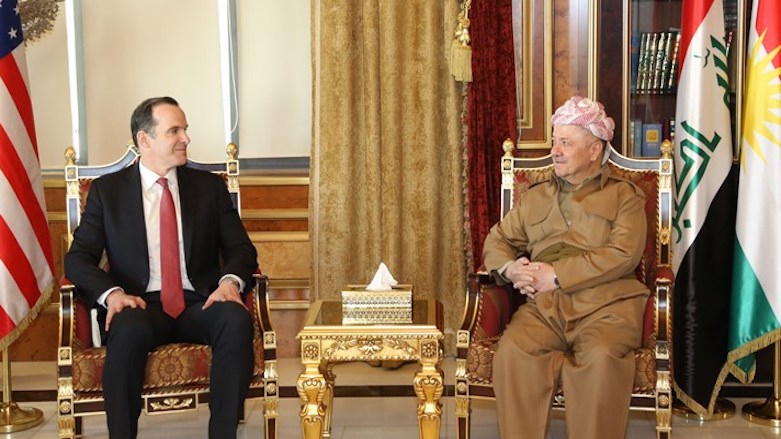McGurk meets Masoud Barzani, praises his historic role and hails Kurds’ importance in Iraq

WASHINGTON DC (Kurdistan 24) – For the first time since the Sep. 25 Kurdistan independence referendum, Brett McGurk, US Special Envoy for the Global Coalition to Defeat ISIS, met with Masoud Barzani, head of the Kurdistan Democratic Party (KDP) and the former President of the Kurdistan Region.
McGurk visited Erbil on Wednesday, for the second time in three days, meeting with Barzani on his second visit.
In their meeting, McGurk congratulated the KDP leader on “the successful parliamentary elections and his party’s victory in the Kurdistan Region,” a summary released by Barzani’s office explained.
The KDP won the largest share of the vote among the Kurdish parties, according to preliminary results issued by Iraq’s High Electoral Commission (IHEC). It is expected to receive some 25 seats in the new parliament.
More broadly, however, the election results were surprising, with little good news for the US. Prime Minister Haidar al-Abadi, the US favorite, fared poorly—“a ruthless setback,” as Nahro Zagros, Vice-President of Soran University, described it.
McGurk praised the role that Barzani has played throughout his long career: “important and historic”—significant language, as McGurk was a key figure, driving US opposition to the Kurdistan independence referendum, while Barzani was a key force behind it.
"It seems that McGurk realizes now that what he wants to achieve in Iraq can't be done without Barzani,” an informed Washington source advised Kurdistan 24.
“Why would they ever think otherwise?” Entifadh Qanbar, an Iraqi-American and head of the Future Foundation in Washington DC asked. “The alliance between the Shi’a and the Kurds was the foundation of post-Saddam Iraq,” he added.
And as US officials are realizing, the Kurds are the more moderate, more modern, more western-oriented part of the equation
The elections have created a real problem for the US. The largest share of the vote went to the list organized by Muqtada al-Sadr, the firebrand Shi’ite cleric who has established himself as both an anti-Iranian and anti-American figure.
As the political struggle heats up over the formation of a new government, it is not entirely clear where Sadr will wind up. Some experts, like the Hudson Institute’s, Michael Pregent, argue that Iran will succeed in twisting Sadr’s arm to do what it wants, despite his anti-Iranian stance.
The second most successful electoral list was “Conquest,” even worse news for Washington. The Conquest list is dominated by the military leadership of the pro-Iranian militias, first brought into being to fight the Islamic State (IS), but which now have assumed a permanent existence.
The US recognizes “the necessity” of the Kurdistan Region’s involvement in Iraqi politics “as a powerful and effective force,” McGurk told the Kurdish leader, while he asked for “maintaining and broadening” relations between Washington and Erbil.
Critics have charged that the US stance toward the independence referendum and subsequent events weakened the Kurds, increasing their dependence on Iran. Tehran has strong influence in Baghdad, and the US insistence on the subordination of Erbil to Baghdad has meant that the Kurdistan Region is obliged to pay more attention to Iran and what it wants.
Barzani and McGurk discussed the Iraqi elections and “emphasized that without the active and real participation of the Kurdistan Regional Government,” the read-out from Barzani’s office states, “all attempts to establish a new government” and create “political stability would fail.”
"McGurk knows the person with the heaviest weight in Kurdistan is Masoud Barzani, and the Kurds, will, once again, be the kingmakers,” the informed Washington source explained.
Qasim Soleimani, head of the Quds Force of Iran’s Islamic Revolutionary Guard Corps (IRGC) is now in Baghdad, there to promote the formation of a government friendly to Iran.
What looks to be emerging is a contest between Washington and Tehran, McGurk and Soleimani, over the composition of the next Iraqi government.
The US will need all the friends it can find. Hence, McGurk’s repeat trips to Erbil and his warm words for the man whom the French philosopher, Bernard-Henri Levy, has dubbed, “The Old Lion of Kurdistan.”
(Kosar Nawzad contributed to this report)
